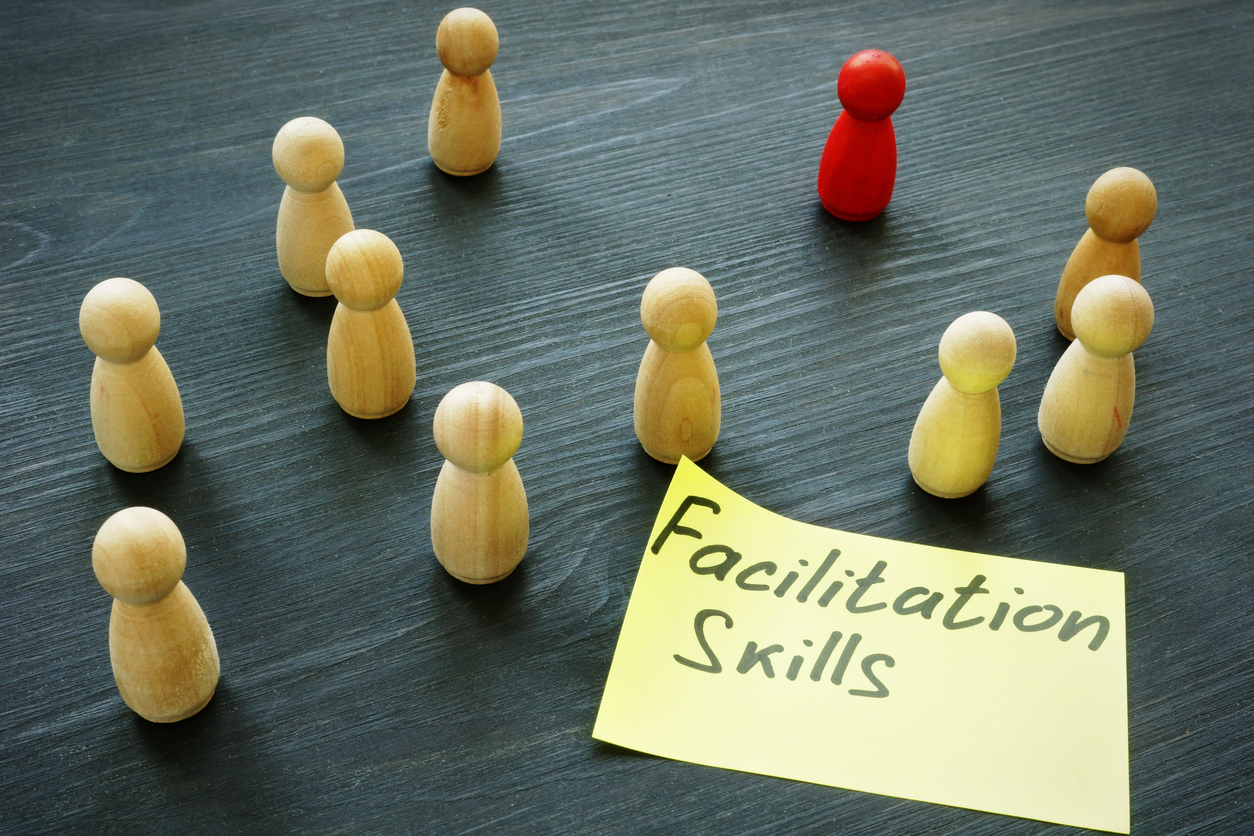
What Skills Do Facilitators Need To Have To Be Successful? – It’s not unusual for someone to contact our offices asking for training on facilitation when what they are actually looking for is a workshop on how to train. The confusion between training and facilitation is a real one. It’s not just a matter of semantics. (read our post on what is the difference between a facilitator and a trainer)
Trainers and facilitators do very different things. The problem is, somewhere along the line, the two terms merged, and many people use them interchangeably. For people who want to enhance their training skills, we offer our internationally certified three-day Train-the-Trainer Workshop.
While TrainSMART’s Training-the-Trainer course discusses the similarities and differences between training and facilitation, the focus is primarily on helping participants gain the skills and techniques to design, develop, and deliver training.
People interested in obtaining skills to facilitate are encouraged to take our two-day Facilitation Skills workshop.
Can you be a trainer and a facilitator? Absolutely, but just usually not at the same time.
A trainer’s role is to help people change their behaviors either by helping them gain new knowledge and skills or by helping them change their attitudes.
A facilitator’s role is different. They need to have a laser focus on providing a process to help people make decisions to achieve their goals. They are part-timekeepers, mediators, question-asker, and guides. A facilitator needs to be detached from the decisions and the outcomes. They shouldn’t have any skin in the game.
Think of it this way, if a conflict arises on a team, a trainer might hold a workshop to teach team members conflict management techniques. They may do a case study or role play to practice those skills so that they will be available to them during their next conflict.
If a facilitator is asked to work with a team that is having conflict, they will approach the situation very differently. Instead of teaching the team conflict management techniques, the facilitator would help team members work through the conflict by guiding them to find solutions that are acceptable to the group.
Three Key Skills Every Skilled Facilitator Needs To Have
The Ability To Create A Psychologically Safe and Open Environment
One of the key ways a facilitator can create this environment is by modeling it’s okay to make mistakes. Now, this is trickier than it sounds because when a facilitator is working with a group that doesn’t know them, admitting their own fallibility has the potential of creating blowback. There are always some in a group that may lose confidence in a facilitator who admits to being wrong. So, it’s a delicate dance. But that is the world of facilitating – knowing when to do the two-step, the tango, the twist, or the rumba. The key is not to celebrate the mistake but to emphasize what you learned because of the mistake. In most cases, this sets up an environment where participants might be willing to share what they learned after a mistake.
Active Listening
For purposes of facilitation, we’re defining active listening as the ability to understand things from the speaker’s point of view. It’s not so much the ability to hear what is being said but is more of an attitude that leads to shared understanding. The ability to actively listen is a gift that not everyone has. Think about your own lives and people who have dramatically different points of view on issues that you care deeply about. Practice earnestly trying to see things from their perspective without overlapping your own biases. It’s not an easy thing to do. Now think about an issue that you are not emotionally tied to and attempt to see it from various viewpoints. That’s much easier. Being emotionally neutral, aka the ability to act like you are Switzerland, is one of the most essential traits that facilitators bring to every session.
Active listening requires being very skilled at asking questions. During facilitation, the best kind of questions are open-ended: The who, what, where, why, when, and how questions. But not all open-ended questions are created equally, and while a reporter can get away with asking a WHY question, for a facilitator to ask “Why” may be interpreted as accusatory.
The art of facilitation is asking provocative questions that are not threatening or accusatory that stimulate thinking. Facilitators pay attention to the words they use. The speech is intentional. They use specific words and phrases that help make people feel comfortable and welcome to speak their minds. For most of us, speaking in this neutral, supportive vocabulary is like learning a second language. It’s not necessarily easy, but it is doable.
A Sense of Timing
When groups get together without a facilitator, more often than naught, the conversations go down bunny hills, and decisions are tabled to the next meeting. When a professional facilitator is at the helm, there is structure and discipline to the conversations as well as time limits. Conversations are more than people sharing information; they are purposeful: to provide information to make decisions. The facilitator does that by knowing when it’s time to end a discussion, when it’s time to change the topic, or when it’s time to gently and tactfully tell a long-winded participant to stop talking.
Becoming a successful facilitator takes practice, practice, practice. But it starts by understanding which skills are necessary to practice. In TrainSmart’s two-day Facilitation Skills Workshop participants will be introduced to:
- The competencies linked to effective small-group facilitation
- The difference between content and process and why it’s important to know the difference
- The stages of team development and ways to help teams through each stage
- Common process tools to make meetings easier and more productive